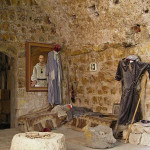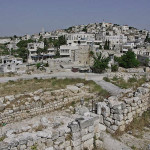 |
Orchid flower gift in Lady Cloister-
The orchid is a flower of magnificence
that brings a universal message of love,
beauty, wisdom, and thoughtfulness. |
Patristic Lectionary, Night Office,
A READING FROM THE BOOK OF NUMBERS
(The
murmuring of Miriam and Aaron against Moses: Numbers 12:1-15)
Miriam and Aaron spoke against Moses because of the Cushite
woman whom he had married, for he had married a Cushite woman; and they said,
“Has the LORD indeed spoken only through Moses? Has he not spoken through us
also?” And the LORD heard it. Now the man Moses was very meek, more than all
men that were on the face of the earth. And suddenly the LORD said to Moses and
to Aaron and Miriam, “Come out, you three, to the tent of meeting.” And the
three of them came out. And the LORD came down in a pillar of cloud, and stood
at the door of the tent, and called Aaron and Miriam; and they both came
forward. And he said, “Hear my words: If there is a prophet among you, I the
LORD make myself known to him in a vision, I speak with him in a dream. Not so
with my servant Moses; he is entrusted with all my house. 8 With him I speak
mouth to mouth, clearly, and not in dark speech; and he beholds the form of the
LORD. Why then were you not afraid to speak against my servant Moses?”
And the anger of the LORD was kindled against them, and he
departed; and when the cloud removed from over the tent, behold, Miriam was
leprous, as white as snow. And Aaron turned towards Miriam, and behold, she was
leprous. And Aaron said to Moses, “Oh, my lord, do not punish us because we
have done foolishly and have sinned. Let her not be as one dead, of whom the
flesh is half consumed when he comes out of his mother’s womb.” And Moses cried
to the LORD, “Heal her, O God, I beseech thee.” But the LORD said to Moses, “If
her father had but spit in her face, should she not be shamed seven days? Let
her be shut up outside the camp seven days, and after that she may be brought
in again.” So Miriam was shut up outside the camp seven days; and the people
did not set out on the march till Miriam was brought in again.
FIFTH WEEK OF LENT
SUNDAY
Year II
First Reading Numbers 12:1-15
Responsory Heb
3:5-6;
Sir 45:1.4
Moses was faithful in
God's house as a servant; + but Christ was faithful
as a son set over God's house, and we are that house.
V. Moses was loved by God
and man; his memory is blessed. The Lord sanctified him for his faithfulness
and gentleness. + But Christ was ...
Second Reading From a homily by Origen of
Alexandria (In Num., Horn. 7, 1-2: se 29,133-136)
The glory of Moses
According to Saint Paul, everything that happened
to the Israelites was symbolic, and was recorded as a warning to us. If this is so we should
try to learn what we can from the story of Aaron and Miriam, who were rebuked
by God for speaking against their brother Moses. Miriam received the additional
punishment of leprosy. The chosen people took this chastisement so much to
heart that they discontinued their journey to the promised land, and the Tent
of the Presence stood still, until Miriam had completed her seven days'
exclusion from the camp. What we are given here, in the first place, is a
useful and necessary lesson not to speak ill of our neighbors, and not to make
derogatory remarks about good and holy people, or indeed about anyone at all,
when we see the anger and vengeance of God that result. Those who do so may be
asked to speak against Moses. Because of this they become spiritual lepers;
their unclean hearts exclude them from the camp which is the Church of God.
Now whether speaking
against Moses means that these people are heretics, or whether they are
members of the Church who slander their brothers and sisters and speak ill of
their neighbors, there is no doubt that all who practice this vice are lepers
at heart. In the case of Miriam, this leprosy was healed on the seventh day,
thanks to the intervention of Aaron the high priest; but as for us, if we allow
ourselves to indulge our cruel habit of speaking ill of people and our souls
are punished with leprosy, we shall continue in our spiritual uncleanness until
the last day of all, that is until the day of resurrection, unless we change
our ways while there is still time for us to repent and turn to the Lord Jesus,
asking him to help us to do penance and be purified.
And now let us hear the
account of what happened afterward, and how the Holy Spirit paid tribute to
Moses. SCripture tells us that the Lord came down in a pillar of cloud and
stood at the door of the Tent of the Presence. Aaron and Miriam were summoned,
and they both came forward. The Lord said to them: Listen
to my words. If anyone of you is a prophet, I make myself known to him in visions, and speak to him in dreams. It
is not so, however, with my servant Moses; he alone is faithful of all my
household. With him I speak face to face,
clearly and not by means of symbols or parables, and he has seen the glory of
the Lord. Why then were you not afraid to speak against my servant Moses? Scripture goes on to say
that the Lord's anger struck them, and he dismissed them from his presence.
When the cloud departed from the tent, there stood Miriam, white as snow with
leprosy.
You see what punishment
those envious tongues brought on themselves, and in contrast what honors they
earned for the brother they had abused. He was honored, they were disgraced;
he was covered with glory, they were covered with leprosy; he was praised, they
were blamed.
The hidden meaning of the symbolic events of the
Old Testament was explained by Saint Paul when he wrote: We know that our ancestors were all guided by the cloud, and all were
baptized into Moses in the cloud and in the sea, and all ate and drank the same
spiritual food and drink, since they drank from the spiritual rock that
followed them, and that rock was Christ. You see how Paul opens up the
significance of the Old Testament symbols, and teaches us about the realities
which these symbols represented. For Moses, the rock was one such symbol,
whereas for us, now that God speaks face to face through the Old Testament, the
reality signified is clearly revealed: the rock is Christ. In former times
baptism was veiled in the symbols of the cloud and of the sea; but now the full
reality of our rebirth is revealed in water and the Holy Spirit In those days
manna was the symbolic food of the people, but now the true food prefigured by
the manna is clearly declared to be the flesh of the Word of God., even as he
himself tells us: My flesh is food
indeed, and my blood is drink indeed.
Responsory
1 Corinihians 10:10-11.6
Do not complain as some of
our ancestors did and were killed by the destroyer.
+All these things that
happened to them were symbolic and were written down for our instruction.
They are warnings for us
not to desire evil as they did. + All these things ...








+a.jpg)
+b.jpg)
+c.jpg)







